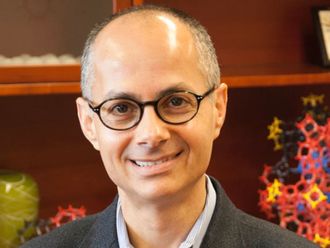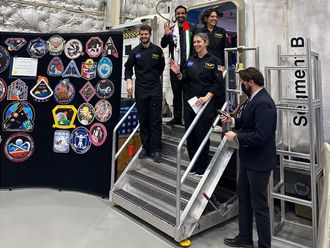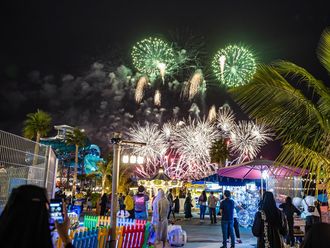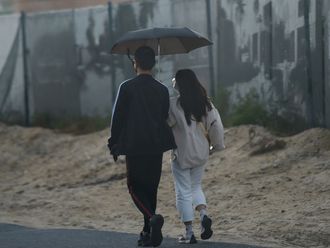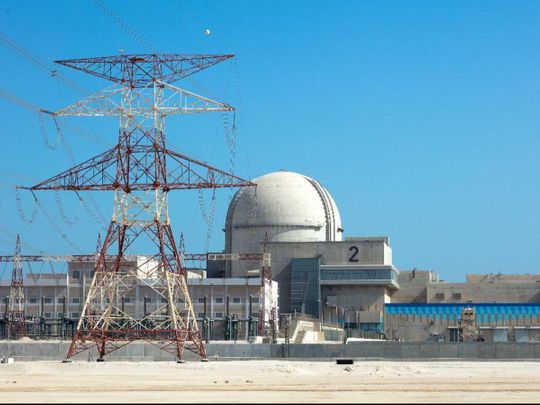
Abu Dhabi: Unit 2 at the Barakah Nuclear Energy Plant in Abu Dhabi has commenced commercial operations, adding another 1,400 megawatts of clean electricity to the national grid.
The Emirates Nuclear Energy Corporation (ENEC), plant operator, announced the development today, adding that the plant is now supplying a total of 2,800 megawatts of zero-carbon emission electricity to the grid, bolstering energy security and propelling the country ahead in meeting its sustainability goals.
Decarbonisation effort
“This new milestone takes ENEC and its subsidiaries to the halfway mark of delivering on its commitment to supply up to a quarter of the country’s electricity needs, reliably powering the economy by generating clean electricity 24/7 and significantly contributing to the UAE’s Net Zero by 2050 initiative. With Unit 2 commercially operational, the Barakah Plant, the first multi-unit operating Plant in the Arab World, is leading the largest decarbonisaation of any industry in the region, delivering thousands of megawatts of carbon-free electricity every single day,” the Abu Dhabi Media Office said in a statement.
‘Emissions-free electricity’
“The Barakah Nuclear Energy Plant is a sustainable powerhouse for the UAE. The start of commercial operations at Unit 2 doubles the Barakah Plant’s generation of emissions-free electricity, enabling rapid decarbonisation of the UAE’s power sector in pursuit of Net Zero 2050. With Unit 2 reaching commercial operations less than 12 months after Unit 1, we have demonstrated the UAE’s megaproject capabilities, building institutional knowledge to enhance delivery to the highest standards and offer a successful case study for other nations looking to diversify their energy portfolio using a proven and sustainable technology,” said Ibrahim Al Hammadi, managing director and chief executive officer at ENEC.
Tackling climate change
By developing the Barakah plant, ENEC is supporting the country’s strategy to diversify energy sources. It is also preventing millions of tons of carbon emissions and helping to tackle climate change, delivering climate solutions today.
When its four units are commercially operating, the Barakah Plant will produce up to 25 per cent of the UAE’s total electricity needs, and will prevent over 22.4 million tons of carbon emissions annually, equivalent to the emissions of 4.8 million cars. The Barakah Plant significantly boosts the UAE’s energy security through domestic clean electricity generation.
In fact, by 2025, the plant will be responsible for generating more than 85 per cent of Abu Dhabi Emirate’s clean electricity, making it the biggest contributor to reducing Abu Dhabi’s carbon emissions by 50 per cent by the middle of the decade.
Doubling clean energy
”Today is an integral day for the delivery of the Barakah Nuclear Energy Plant project with the commercial operations of Unit 2, we are now selling double the volume of electricity to the Emirates Water and Electricity Company (EWEC) per the Power Purchase Agreement signed in 2016. We are committed to efficient and reliable power generation to ensure homes, business and industry across the UAE have continuous access to clean baseload electricity and will do so for the coming 60 years ahead. The sale of electricity further supports Abu Dhabi’s Clean Energy Certification program, allowing more businesses to demonstrate the sustainability credentials and stimulating the growth of our Net Zero economy,” said Nasser Al Nasseri, chief executive officer of Barakah One Company, ENEC’s subsidiary in charge of representing the financial and commercial interests of the Barakah Plant project.
“The start of Unit 2 commercial operations comes as a result of the world-class operating experience of our teams made up of UAE Nationals and international experts. They have the skills and expertise in the nuclear industry over the years to safely provide constant, reliable and sustainable clean electricity around the clock from two identical units operating in parallel. We are committed to operating the plant in line with the UAE’s robust regulations and international best practice on our ongoing journey to operating excellence,” added Ali Al Hammadi, chief executive officer of Nawah Energy Company, an ENEC subsidiary mandated to operate and maintain the Barakah Plant.
Read more
Total progress
Located in Abu Dhabi emirate’s Al Dhafra region, the Barakah Nuclear Energy Plant, is one of the largest nuclear energy plants in the world, with four APR-1400 units. The Plant’s Units 3 and 4 are currently in the final stages of commissioning, with Unit 3 construction already complete and now undergoing operational readiness preparations, with Unit 4 in the final stages of commissioning prior to construction completion. The development of the Barakah Plant as a whole is now more than 96 per cent complete, having steadily progressed since construction started in 2012.
While delivering on its clean energy vision through the peaceful nuclear program, ENEC is also providing talented UAE youth with the skills, expertise and experience necessary to become the future leaders of the nation’s growing peaceful nuclear energy sector.

Net Zero by 2050
Mariam Almheiri, the Minister of Climate Change and Environment, said in a statement on Thursday that UAE is committed to rapidly cutting carbon emissions in order to achieve our Net Zero by 2050 Strategic Initiative to tackle climate change head-on.
“The beginning of commercial operations for Unit 2 of the Barakah Nuclear Energy Plant is a landmark milestone for the UAE as the Nation continues the rapid decarbonization of the power sector by doubling clean electricity production. The Barakah Plant is a powerhouse of sustainability and a key enabler for our ambitious Net Zero agenda. With further units due to come online, the significance of the Barakah plant in achieving Net Zero becomes ever more apparent, with all four units due to supply 25% of the UAE’s electricity, while preventing 22.4 million tons of carbon emissions annually. Congratulations to ENEC and its subsidiaries on leading the largest decarbonization effort in the Arab World,” she added


